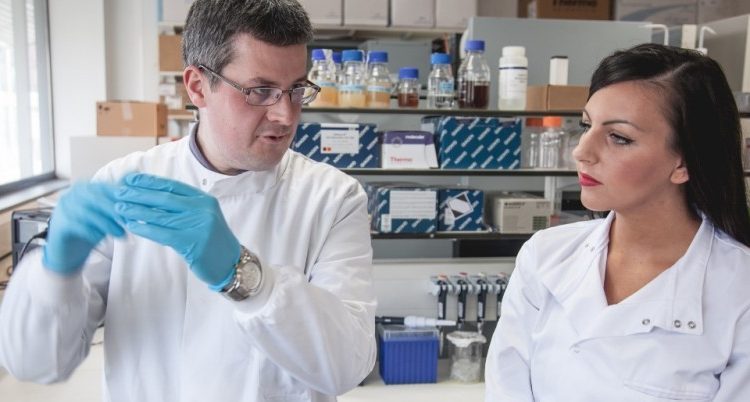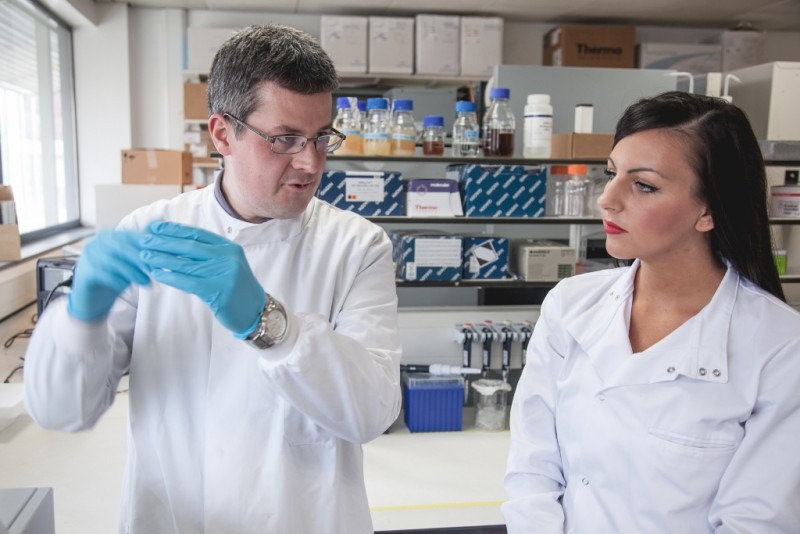Funding for skin cancer drug research approved in Liverpool
A pioneering project in the treatment of skin cancer, which is the first of its kind in the world has been given the go ahead at the University of Liverpool.
North West Cancer Research (NWCR) has announced more than £63,000 worth of funding for the one year research project, which will investigate how to prolong the effects of the approved drug, Vemurafenib, for the treatment of Malignant Melanoma a form of skin cancer.
The world-leading research will be headed by Dr Michael Cross lecturer in the Department of Molecular and Clinical Pharmacology at the University of Liverpool and Mr Rowan Pritchard Jones, Consultant Plastic Surgeon and Honorary Clinical Lecturer at Liverpool University
It will look improving the effects of the drug Vemurafenib, which provides profound tumour regression for a significant period of time in patients with malignant melanoma – the most deadly form of skin cancer.
Malignant Melanoma Skin cancer is the fifth most common cancer in the UK. On average 13,000 cases are diagnosed every year. In the North West on average 1,416 skin cancer cases are diagnosed each year – with 295 of these cases coming from Merseyside. (*See notes to editor)
Dr Michael Cross said:
“Until recently patients developing advanced melanoma, which spreads to other areas of the body had few treatment choices and a poor prognosis. The development of the drug Vermurafenib, has allowed a significant breakthrough in treatment, with 60% of patients witnessing tumour regression, including rapid shrinkage just days into the treatment.
“However, the effect of the drug only lasts six to nine months, as patients develop resistance to the drug causing the tumour to grow and spread again.
“The regrowth of the tumour is caused by how the remaining or residual melanoma cells behave. As they mutate they begin to grow in a new way, forming a tumour which unfortunately is resistant to the Vermurafenib treatment.
“It is our belief that this regrowth occurs when drug-resistant melanoma cells secrete certain proteins, such as VEGF-A and VEGF-C which have the potential to stimulate the cells which line the blood vessels. This allows the drug resistant tumour cells to obtain nutrients and oxygen, causing them to grow and spread further– which could be leading to relapses in many patients.
“With the support of NWCR we hope to confirm these findings and look at ways to use drugs already available to breast and prostate cancer patients, in order to minimise this lethal drug resistance to Vermurafenib.
“The aim of the research is to discover data on the drug-resistance of melanoma and prolong the life expectancy for patients with this disease.”
The research will take place at the Department of Molecular and Clinical Pharmacology, University of Liverpool and use samples from patients with a range of different melanoma cells that have received Vermurafenib as part of their treatment.
The research will also use a novel 3D tumour spheroid cell model, which essentially builds a tumour using both the melanoma cells and the normal skin and blood vessel cells that surround it.
Plastic surgeon, Mr Rowan Pritchard Jones, will provide a clinical angle to the research project and he explains:
“Plastic surgeons provide the mainstay of treatment for melanoma because full and early removal of skin cancer offers the best chance of cure.
“Some of our patients have more aggressive disease that is beyond the reach of their surgeon, and for the first time, we have seen the development of new treatments for melanoma in the last few years that have a significant impact. Our challenge is to improve the effectiveness of treatments to improve the outcome of our patients.
“As a surgeon I can influence the care of a handful of patients every day in the operating theatre. As cancer researchers we have the potential to improve the outcome of thousands of patients. The challenge is to translate these findings from the laboratory into the clinic.”
Dr Cross added:
“The North West unfortunately has some of the highest rates of skin cancer in the UK and the reality is that these figures will continue to rise for at least the next twenty years.
“Whereas with other cancers we expect to see a plateau and eventual decrease in the number of new cases, this is unlikely to happen with skin cancer, as the effects of historical sun worshipping and the use of sun beds begin to manifest themselves.
“Currently there has been little research into skin cancer therapies, which is why prognosis for some patients can be poor. However, thanks to funding from organisations such as NWCR we are now able to start making inroads into developing more effective treatments for this disease.”
Anne Jackson, Chief Executive Officer at NWCR, said:
“As an organisation we are delighted that we are now able to fund research such as this, which will potentially directly benefit people living in the region.
“None of this can be done without the support of our fundraising committees which operate right across the North West. All of our research fellows recognise the hard work which is being generated by our volunteers, helping to keep this vital research work in the region – which is why every penny we raise is so important.”


